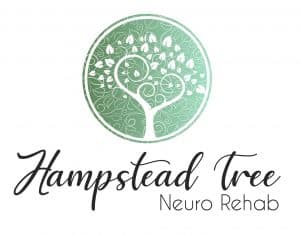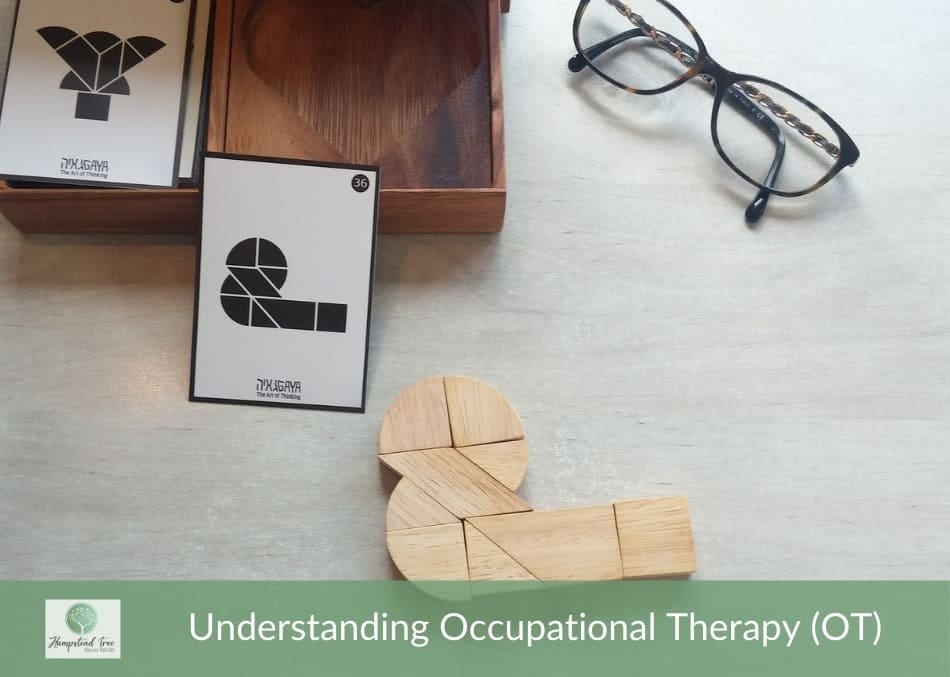
Adjusting to life with a debilitating injury or a brand-new diagnosis can be exhausting. There is so much to adjust to, and you may even have to re-learn basic tasks like how to feed and dress yourself. Fortunately, there are healthcare professionals who are equipped to help you deal with these changes and restore your independence and confidence.
Occupational therapy is a state registered health and science profession that provides a type of therapeutic care that teaches and helps patients to live independently despite their disability, chronic illness, or other impairment(s). A practitioner will assess their client’s condition, what is important to them, their environment, and lifestyle to determine where they can improve on their daily life including personal care, cooking, memory, and other skills to return to life as usual and thrive.
Since the scope of occupational therapy is so broad, many people lack a basic understanding of how this type of healthcare can improve their life and well-being. To learn more about this branch of Healthcare provision and decide whether you can benefit from it, see the information below.
Understanding Occupational Therapy
Occupational therapy (OT) is the practice of assisting individuals to progress through life by using meaningful everyday activities as a therapeutic medium. This work can be applied to all kinds of life-altering conditions, including mental, physical, cognitive and developmental disorders and challenges.
OT primarily centers on the provision of tools and behaviours that enable people with the following limitations to maintain autonomy in their daily lives (RCOT):
- Temporary or chronic illnesses
- Debilitating injuries
- Physical, mental, neurological or developmental disabilities
Occupational therapists assess their clients and develop a comprehensive treatment plan based on the gathered information. The program is not necessarily designed to eliminate or otherwise resolve the impairment but to enable the client to adapt and live a full life. Thus, a critical part of your OT’s job is to help you achieve the tasks you both want and need to complete.
OT services are available for people of all ages. For children, OTs can help individuals adapt to social and school environments, increasing confidence within themselves and in interpersonal interactions. On the other hand, adults will find that OT interventions help them better understand changes within themselves, which improves their ability to acclimate to their conditions. (American Occupational Therapy Association AOTA).
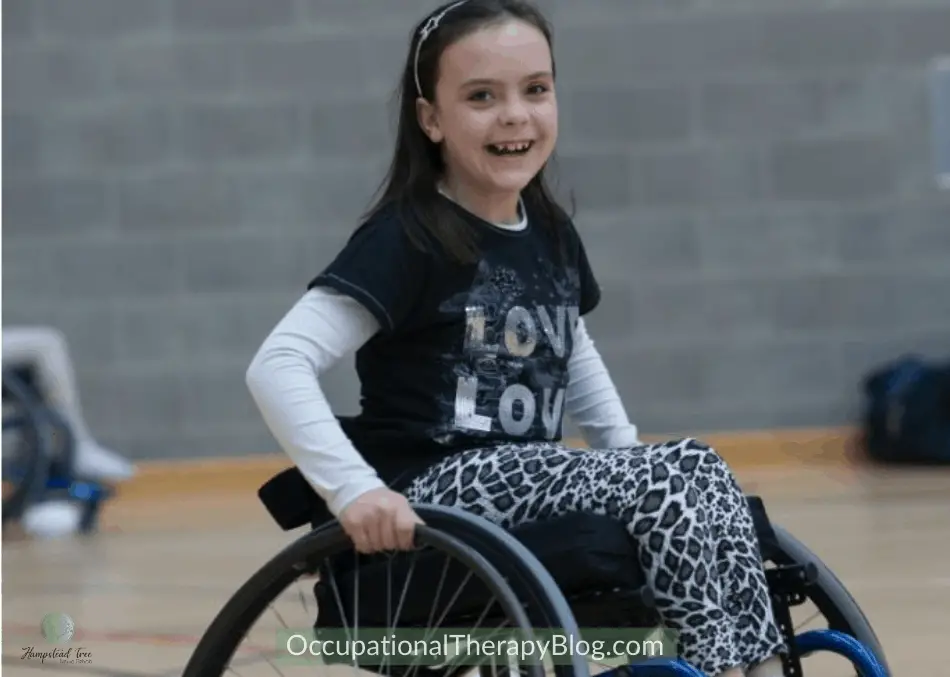
What Do Occupational Therapists Do?
As mentioned above, one of an OT’s primary responsibilities is to perform assessments on their clients to determine an appropriate plan of action that helps them lead a fulfilling life. This entails assistance and support in recovery and coping with various impairments and illnesses. In simpler terms: OTs help people overcome their limitations to achieve a meaningful and autonomous quality of life.
The Royal College of Occupational Therapy (RCOT) provides a general look at an OT’s daily responsibilities:
- As a part of the initial (and ongoing) assessments, the OT will ask their clients questions about their current condition and medical history. To attain a deeper understanding of how this condition impacts the client’s life, the OT will also observe them performing specific tasks.
- Based on observations and client answers, the OT can develop a multifaceted treatment plan that includes long- and short-term goals. Along with this plan, the OT will provide activities that help the client accomplish these goals.
- Depending on the client’s specific condition, the OT may teach them how to perform basic tasks, such as getting dressed, feeding themselves, preparing for college or work, etc.
- At times, clients may need extensive lifestyle changes to improve their condition and improve their ability to function independently daily. To achieve this, an OT may assess a client’s home environment and workplace to identify where improvements can be made.
- Family and friends play a critical role in a client’s ability to cope with their condition. To improve their client’s quality of life, an OT may reach out to loved ones to provide education on the individual’s impairments and prepare them to support them as they acclimate.
- OTs will likely suggest specific aids for their clients, such as mobility equipment (wheelchairs, walkers, rollator frames, rails), or items that help with eating (adapted cutlery, weighted cups and sticky mats.
- An OT needs to uphold and maintain standards set up by the Health and Care Professionals Council (HCPC) on documentation on their client that reflects their progress for the assigned treatment plan and communication with relevant colleagues to provide continual support. This information is also used for billing purposes.
OTs can work in all sorts of facilities, from community centres, schools, colleges, mental health facilities to general hospitals. Their services are meant to assist patients in all life stages, whether they are coping with a recent traumatic event such as a car accident or learning to live with a chronic illness. Whether your problem is a diagnosis that is out of your control or preventable, addictive behaviours, you can find support in an OT.
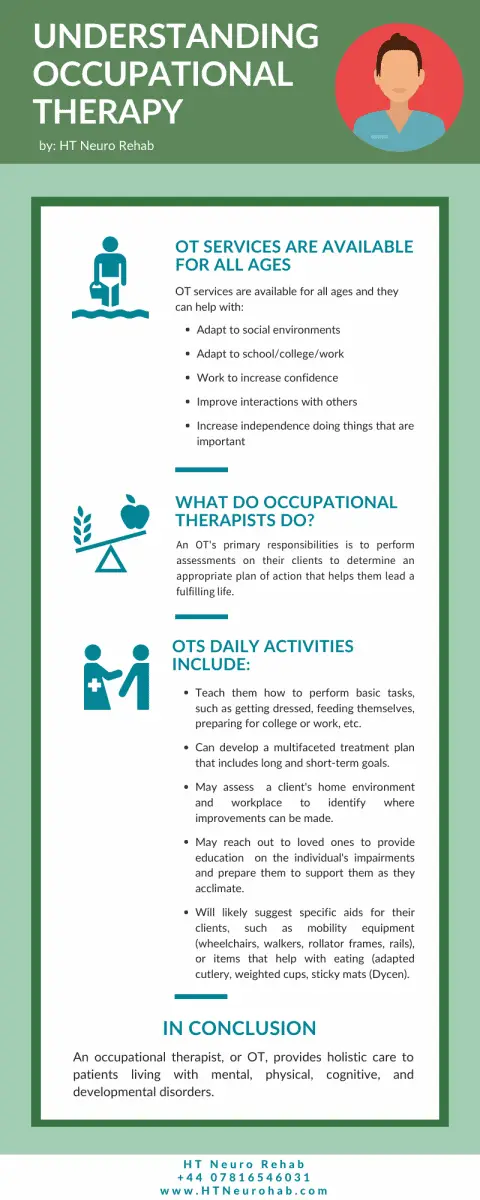
Can Occupational Therapists Provide Diagnoses?
Although OT is a protected healthcare title and Ots are trained to assess and treat their patient’s conditions, they do not have the authority or permission to issue diagnoses. Doing so would risk that OT’s license and certification. However, they do work alongside professionals such as GPs and consultants to assist with diagnosis. The Health and Care Professions Council (HCPC) and the Royal College of Occupational Therapy (RCOT), enforce these regulations.
Still, this does not reduce the value of seeking OT treatment. For example, an OT still provides incredibly useful insight into how you and your loved ones can achieve a fulfilling, stable life despite a disruptive diagnosis or behavioural, cognitive, or emotional development. They can provide this insight by assessing the following ( Kennedy Krieger Institute):
- Range of motor control, including both fine and gross movements
- Visual capacity, specifically how an individual’s movement relates to their vision
- Control of oral muscles
- Ability to care for oneself in terms of eating, personal, and dressing
- Ability to perceive and interpret various sensations
- Ability to plan and execute movements
- Nervous system control over muscles and reflexes
Although they cannot provide a definitive diagnosis of your condition based on their assessment, their in-depth review of your life, mind, and body still provides a clear perspective on which they can base an effective treatment program.
Examples of Occupational Therapy
Occupational therapy can be applied to all sorts of mental, physical, cognitive or developmental disorders, as well as temporary and chronic illnesses and addiction. The following are some examples of how you might see OT applied in your or a loved one’s life (Understood):
- Stroke victims often struggle with hand or fine motor skills. To assist with this, an OT might assess movements and strength, use treatment techniques such as Functional electrical stimulation (FES), Bobath and use activities chosen by the client as a therapy medium. These can include easy things such as picking up objects, handwriting, knitting, or more complex things such as cooking meals. Such activities will help the person to gradually regain movement, motor control, strength and sensation in their extremities and digits.
- Children living with sensory disorders might have trouble with particular foods’ textures, hearing specific sounds, and experiencing other types of sensations. An OT might prescribe a “sensory diet” that helps them get used and regulate their feeling, hearing, smelling, or seeing specific stimuli. Such a diet will help them control and regulate their emotional reactions and prevent over or under stimulation and behaviours that follow.
- People living with major depressive disorder may lack the motivation and energy to perform basic self-care tasks regularly. To help with this, an OT might ask their patient to set goals and break down daily responsibilities to help accomplish one task at a time instead of becoming overwhelmed by an entire day’s to-do list (AOTA)
Your OT treatment program will be based on a thorough evaluation of your specific needs and conditions. It will be optimized to help you attain the highest possible quality of life. These examples represent only the tip of the iceberg of what an OT can do for you.
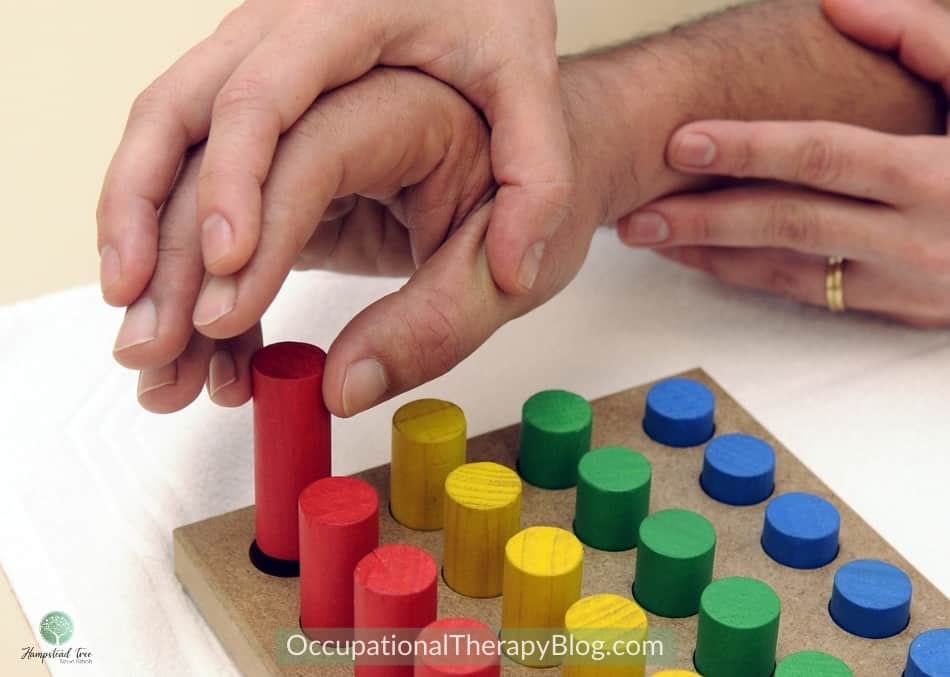
In Conclusion
An occupational therapist, or OT, provides holistic care to patients living with mental, physical, cognitive, and developmental disorders. Although they cannot issue official diagnoses to their clients, they can develop a highly effective, personalized treatment plan based on in-depth, continual diagnoses of your condition. Regardless of your age or impairment, you can benefit from having an OT’s guidance and support.
Content Disclaimer
The information contained above is provided for information purposes only. The contents of this article are not intended to amount to advice and you should not rely on any of the contents of this article. Professional advice should be obtained before taking or refraining from taking any action as a result of the contents of this article.OccupationaltherapyBlog disclaims all liability and responsibility arising from any reliance placed on any of the contents of this article.
Copyright Notice
These works are protected by copyright laws and treaties around the world. We grant to you a worldwide, non-exclusive, royalty-free, revocable licence to view these works, to copy and store these works and to print pages of these works for your own personal and non-commercial use. You may not reproduce in any format any part of the works without our prior written consent.
Copyright © 2021 OccupationalTherapyBlog
